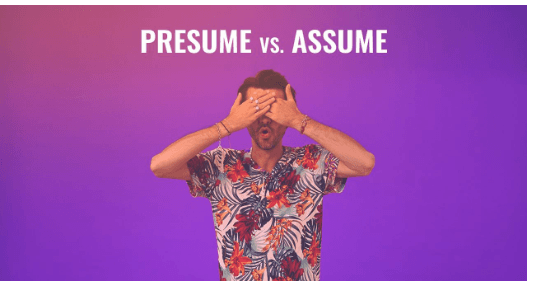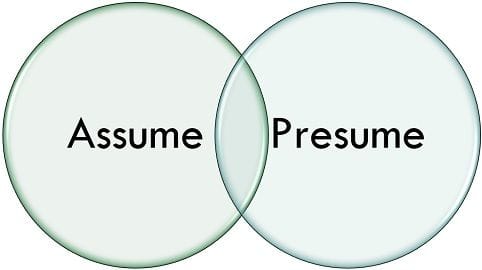Decode English: Understand and Use 'Presume vs Assume' with Simple Examples

Consider this common scenario. During a team meeting, your boss says, "Rajesh, we presume you will finish the project by next week". A wave of confusion hits you as you wonder if 'presume' means the same as 'assume'. You're not alone. The confusion between 'presume' and 'assume' is a challenge that many English learners face.
Understanding the correct use of these terms is important for effective communication. Especially in professional and academic settings where every word matters.
This article will guide you through a detailed explanation of both terms, with examples and tips to remember their difference. Let's dive into understanding these two commonly confused words!
What Do ‘Presume’ and ‘Assume’ Mean?
'Presume' implies a belief or action based on reasonable evidence or likelihood. For instance, you might say, "Since it's raining outside, I presume he would have taken the umbrella".
'Assume' suggests a belief or action taken without proof or guarantee. For instance, you could say, "He hasn't called yet, so I assume he must be busy".
Both words are about beliefs, but the main difference is how sure or supported those beliefs are. Check out this comparison table for a clearer 'Presume Vs Assume' meaning.
Word | Meaning | Level of Certainty |
Presume | To believe based on probability | High (based on some evidence) |
Assume | To believe without validation | Low (based on assumptions) |
Understanding ‘Presuming’ Vs ‘Assuming’ Through Examples
Let's clarify the difference between 'presume' and 'assume' with some real-life contexts. Here are two scenarios:
Let's imagine your colleague hasn't shown up to work for three days without any information. You might say, "I presume she is sick," because you're making an educated guess based on her absence. But, if you see your colleague in the morning with a heavy backpack, you might say, "I assume you're going on a trip." That's because it's a prediction based on observation.
In another case, consider two friends discussing a popular movie they haven't seen yet. One might say, "I presume the movie is good as everyone is talking about it," drawing conclusions from popular opinion. But if one of them has read the book on which the movie is based and says, "I assume the movie will stick to the book's plotline," they are making an assumption based on prior knowledge.
These examples show that 'presume' and 'assume' both mean forming beliefs without complete certainty, but they have slight differences. 'Presume' is about what's likely or probable, while 'assume' is about guessing without solid proof.
For more examples of everyday scenarios like these, do check out our post on "61 Must-Know English Sentences for Daily Use".
Common Misunderstandings Between Presume and Assume
Non-native speakers often interchange 'presume' and 'assume', creating confusion. Some typical errors include:
Using 'presume' for guessing without evidence.
Using 'assume' when there's a reasonable basis for belief.
How to Avoid Mistakes with ‘Presume’ and ‘Assume’
To master the differences of 'presume' and 'assume', follow these steps:
Remember: 'Assume' is guesswork; 'Presume' has reasonable grounds.
Practice with sentences, focusing on the presume vs assume meaning.
Practice Makes Perfect – Exercises to Master ‘Presume’ and ‘Assume’

Let's do some exercises to help you differentiate between 'presume' and 'assume'.
1. Fill in the Blanks
I _______ you've done your homework. (Hint: There's certainty based on regular habit)
She _______ it was going to rain and carried an umbrella. (Hint: There's no strong evidence)
2. True or False
"I presume I'll see you at the party" – The speaker is reasonably certain.
"I assume this is your book" – The speaker has a strong basis for this belief.
3. Sentence Completion
I _______ that you're enjoying the cricket match since you're cheering so loudly.
Despite no response, she _______ he had understood her explanation.
Solutions: 1. Presume, Assume; 2. True, False; 3. Presume, Presume.
Final Thoughts
To summarise, remember that 'presume' and 'assume' are not entirely interchangeable. Understanding their usage can enhance your spoken English skills. The key difference lies in the basis of belief. 'Presume’ is based on probability or reasonable grounds, while ‘assume’ is based on no evidence.
Take the discussion we had on 'presume vs assume meaning' as an example. If you presume your train will arrive on time because it generally does, you're basing that presumption on evidence from past experiences. However, if you assume it will rain today even though there are no signs of rain, you're making an assumption without any solid evidence.
With Clapingo's coaching, you can practice small differences in English to get better at speaking. For example, learning 'presume vs assume' can help you speak English confidently, which can be useful in your personal and work life.
FAQs
1. Define assume vs presume.
Presume and assume, both infer a belief or acceptance of something as true without proof. However, they differ in their degree of certainty. 'Assume' implies a general belief based on insufficient evidence or lack of proof.
2. Can you provide some presume vs assume examples?
Here are two scenarios:
Scenario 1: If your friend doesn't show up for a meeting, you can say, "I assume he forgot about our meeting." It means you're guessing without any solid proof.
Scenario 2: If the same friend often forgets about meetings, and again doesn't show up, you may say, "I presume he forgot about our meeting." Here, your presumption is based on past behaviour.
3. When should I use presume vs assume in conversation?
Use 'assume' when you believe something to be true based on incomplete or no evidence. For example, "I assumed she would be late because she always is."
Use 'presume' when you have a reasonable basis for your belief or inference. For instance, if she has told you she will be late, then you can say, "Given her message that she’s stuck in traffic, I presume she’ll be late."
Comments
Your comment has been submitted